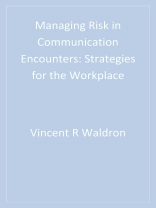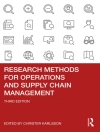The first theory-driven, narrative-based examination of risky communication interactions in the workplace
‘The book does a fine job of incorporating research into a narrative framework that should be accessible for students and individuals in the business community. … The most impressive aspect of the textbook is the use of specific, ′everyday person′ narratives to ground the concepts.’—Mary Helen Brown, Auburn University
‘The advice provided in the book goes beyond simple advice on what or what not to say, but also advises individuals on how to manage the entire process. The book will be well-received in the classroom setting and by practitioners who encounter difficult interpersonal workplace challenges every day.’ —Patricia M. Sias, Washington State University
This book focuses on the types of risky interactions that threaten identities, relationships, and sometimes careers, including voicing dissent, repairing broken relationships, managing privacy, responding to harassment, offering criticism, and communicating emotion. Each chapter is grounded in real-life organizational scenarios, includes recent research, applies a standard theoretical framework, and illustrates a full range of communicative tactics and discourse practices. Throughout the book, authors Vincent R. Waldron and Jeffrey W. Kassing provide examples to spur thinking, raise questions, and help readers understand how organizations benefit when employees communicate in ways that manage risk.
Key Features
• Ethically challenging and personally risky work situations are closely examined to help students understand the types of situations they will encounter in their working lives.
• Vivid examples and narratives illustrate the inevitable tensions that emerge among ethical, relational, and performance obligations in the workplace.
• The roles of discourse, interaction, and communication tactics in managing risk, constructing role identities, and promoting ethical workplaces are explained.
• Real-life organizational scenarios and research on the lived experiences of workers help students understand how individual, organizational, and cultural forces shape workplace communication.
• A theoretical model helps students and scholars integrate existing research, analyze situations, and generate new questions.
Intended Audience
Managing Risk in Communication Encounters: Strategies for the Workplace is intended for use as a supplemental text for undergraduate and graduate courses in organizational communication, business and professional communication, leadership communication, managerial communication, and supervisory communication
Cuprins
1. Introduction: A Theoretical Model for Managing Workplace Risk
The Anatomy of Workplace Risk
Forms of Risk
A Communicative Approach to Risk
A Risk Negotiation Framework
2. Delivering and Seeking Feedback
Why is Delivering and Seeking Feedback Important?
Key Research Studies
Negative Feedback and the Risk Negotiation Cycle
3. Managing Emotion
Why is Managing Emotion Important?
Key Research Studies
Coping with Emotion and the Risk Negotiation Cycle
4. Resisting Bullying and Harassment
Why is Resisting Bullying and Harassment Important?
Key Research Studies
Resisting Workplace Bullying and the Risk Negotiation Cycle
5. Negotiating Workplace Relationships
Why is Negotiating Workplace Relationships Important?
Key Research Studies
Managing Workplace Relationships and the Risk Negotiation Cycle
6. Monitoring Organization Romance
Why is Monitoring Organizational Romance Important?
Key Research Studies
Monitoring Organizational Romance and the Risk Negotiation Cycle
7. Dealing with Difference
Why is Dealing with Difference Important?
Key Research Studies
Dealing with Difference and the Risk Negotiation Cycle
8. Expressing Dissent
Why is Expressing Dissent Important?
Key Research Studies
Expressing Dissent and the Risk Negotiation Cycle
9. Proposing New Ideas
Why is Proposing New Ideas Important?
Key Research Studies
Proposing New Ideas and the Risk Negotiation Cycle
10. Responding to Difficult Team Members
Why is Responding to Difficult Team Members Important?
Key Research Studies
Responding to a Difficult Team Member and the Risk Negotiation Cycle
11. Conclusion: Risk and Next Generation Challenges
Relational Risks
Organizational Risks
Societal Risk
Risk Revisited
Despre autor
Jeffrey W. Kassing is an Associate Professor of Communication Studies at Arizona State University where he teaches graduate and undergraduate organizational, applied, and environmental communication courses, as well as research methods. He earned his Ph.D. from Kent State University with an emphasis in organizational communication in 1997. Dr. Kassing’s primary line of research concerns how employees express dissent about organizational policies and practices. This work, which began with his dissertation and development of the Organizational Dissent Scale, now spans over a decade and appears in numerous scholarly outlets including Management Communication Quarterly, Communication Quarterly, Communication Studies, The Journal of Business Communication, and The International Encyclopedia of Communication. Before seeking a career as an academic, Dr. Kassing worked as an office manager in the real estate industry, as an area coordinator in residence life at a state college, as sales agent in the bicycle business, and as a professional house painter.












